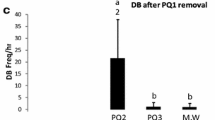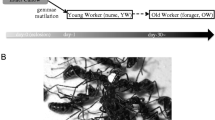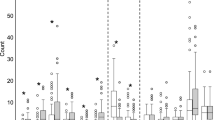Abstract
Primitively eusocial insects exhibit reproductive division of labour such that one or a small number of individuals monopolize reproduction while the remaining function as non-reproductive workers. They also exhibit non-reproductive division of labour such that some workers primarily perform the extra-nidal tasks of foraging, while others primarily perform the intra-nidal tasks of feeding larvae, building the nest and other nest maintenance activities. In some species, queens regulate both reproductive as well as non-reproductive division of labour by means of their dominance behavior toward the workers. Here we show that in the primitively eusocial species R. cyathiformis, (1) the queen shows significantly more aggression towards the potential queen (PQ) than to the rest of the workers; (2) the PQ shows significantly more aggression towards the workers than they show to each other; (3) the activities of the workers such as bringing food and feeding the larvae continue unabated in the absence of the queen; (4) the amount of dominance received by a worker does not predict her rate of foraging; (5) there is a positive correlation between workers’ rates of bringing food and the rates at which they themselves feed the larvae. We suggest that while queen (along with PQ) regulates reproductive division of labour, dominance behavior is not used to regulate the non-reproductive activities of the workers such as bringing food and feeding the larvae; these are self-regulated by individual workers by themselves.





Similar content being viewed by others
Availability of data and material
All data from this study can be accessed from Dryad repository https://doi.org/10.5061/dryad.qfttdz0fr
References
Bang A, Gadagkar R (2012) Reproductive queue without overt conflict in the primitively eusocial wasp Ropalidia marginata. Proc Natl Acad Sci USA 109:14494–14499. https://doi.org/10.1073/pnas.1212698109
Bates D, Mächler M, Bolker B, Walker S (2015) Fitting linear mixed-effects models using. J Stat Software 67(1):1–48. https://doi.org/10.18637/jss.v067.i01
Bhadra A, Mitra A, Deshpande SA et al (2010) Regulation of reproduction in the primitively eusocial wasp Ropalidia marginata: on the trail of the queen pheromone. J Chem Ecol 36:424–431. https://doi.org/10.1007/s10886-010-9770-x
Bruyndonckx N, Kardile SP, Gadagkar R (2006) Dominance behaviour and regulation of foraging in the primitively eusocial wasp Ropalidia marginata (Lep.) (Hymenoptera: Vespidae). Behav Process 72:100–103. https://doi.org/10.1016/j.beproc.2005.11.013
Cameron SA (1989) Temporal patterns of division of labor among workers in the primitively eusocial bumble bee, Bombus griseocollis (Hymenoptera: Apidae). Ethology 80:137–151. https://doi.org/10.1111/j.1439-0310.1989.tb00735.x
Chandrashekara K, Gadagkar R (1992) Queen succession in the primitively eusocial tropical wasp Ropalidia marginata (Lep.) (Hymenoptera: Vespidae). J Insect Behav 5:193–209. https://doi.org/10.1007/BF01049289
Deshpande SA, Sumana A, Surbeck M, Gadagkar R (2006) Wasp who would be queen: a comparative study of two primitively eusocial species. Curr Sci 91:332–336
Gadagkar R (2001) The Social Biology of Ropalidia marginata: toward understanding the evolution of eusociality. Harvard University Press, Cambridge
Gadagkar R (2019) How to design experiments in animal behaviour? Why do wasps fight? Reson J Sci Educ Indian Acad Sci 25:1413–1426
Gadagkar R, Joshi NV (1982) Behaviour of the Indian social wasp Ropalidia cyathiformis on a nest of separate combs (Hymenoptera: Vespidae). J Zool 198:27–37. https://doi.org/10.1111/j.1469-7998.1982.tb02058.x
Gadagkar R, Joshi NV (1983) Quantitative ethology of social wasps: time-activity budgets and caste differentiation in Ropalidia marginata (Lep.) (Hymenoptera: Vespidae). Anim Behav 31:26–31. https://doi.org/10.1016/S0003-3472(83)80170-5
Gadagkar R, Joshi NV (1984) Social organisation in the Indian wasp Ropalidia cyathiformis (Fab.) (Hymenoptera: Vespidae). Z Für Tierpsychol 64:15–32. https://doi.org/10.1111/j.1439-0310.1984.tb00350.x
Giannotti E, Machado VLL (1997) Queen replacement in post-emergent colonies of the social wasp, Polistes lanio (Hymenoptera, Vespidae). Rev Bras Entomol 41:9–11
Hughes CR, Strassmann JE (1988) Age is more important than size in determining dominance among workers in the primitively eusocial wasp, Polistes instabilis. Behaviour 107:1–14
Hughes CR, Beck MO, Strassmann JE (1987) Queen succession in the social wasp, Polistes annularis. Ethology 76:124–132. https://doi.org/10.1111/j.1439-0310.1987.tb00678.x
Jeanne RL (1972) Social biology of the neotropical wasp Mischocyttarus drewseni. Bull Mus Comp Zool 144:63–150
Jha S, Casey-Ford RG, Pedersen JS et al (2006) The queen is not a pacemaker in the small-colony wasps Polistes instabilis and P. dominulus. Anim Behav 71:1197–1203. https://doi.org/10.1016/j.anbehav.2005.11.005
Kardile S, Gadagkar R (2003) regulation of worker activity in the primitively eusocial wasp Ropalidia cyathiformis. Behaviour 140:1219–1234. https://doi.org/10.1163/156853903771980567
Keeping MG (1990) Colony foundation and nestmate recognition in the social wasp, Belonogaster petiolata. Ethology 85:1–12. https://doi.org/10.1111/j.1439-0310.1990.tb00380.x
Keeping MG (1992) Social organization and division of labour in colonies of the polistine wasp, Belonogaster petiolata. Behav Ecol Sociobiol 31:211–224. https://doi.org/10.1007/BF00168649
Keeping MG (1997) Social behavior and brood decline in reproductive-phase colonies of Belonogaster petiolata (Degeer) (Hymenoptera: Vespidae). J Insect Behav 10:265–278. https://doi.org/10.1007/BF02765559
Lamba S, Kazi YC, Deshpande S et al (2007) A possible novel function of dominance behaviour in queen-less colonies of the primitively eusocial wasp Ropalidia marginata. Behav Process 74:351–356. https://doi.org/10.1016/j.beproc.2006.12.003
Litte M (1979) Mischocyttarus flavitarsis in Arizona: social and nesting biology of a polistine wasp. Z Für Tierpsychol 50:282–312. https://doi.org/10.1111/j.1439-0310.1979.tb01033.x
Mitra A, Saha P, Chaoulideer ME et al (2011) Chemical communication in Ropalidia marginata: Dufour’s gland contains queen signal that is perceived across colonies and does not contain colony signal. J Insect Physiol 57:280–284. https://doi.org/10.1016/j.jinsphys.2010.11.014
Naug D, Gadagkar R (1998) The role of age in temporal polyethism in a primitively eusocial wasp. Behav Ecol Sociobiol 42:37–47
Pardi L (1948) Dominance order in Polistes wasps. Physiol Zool 21:1–13
Premnath S, Sinha A, Gadagkar R (1995) Regulation of worker activity in a primitively eusocial wasp, Ropalidia marginata. Behav Ecol 6:117–123. https://doi.org/10.1093/beheco/6.2.117
Premnath S, Sinha A, Gadagkar R (1996) Dominance relationship in the establishment of reproductive division of labour in a primitively eusocial wasp (Ropalidia marginata). Behav Ecol Sociobiol 39:125–132. https://doi.org/10.1007/s002650050274
Reeve HK, Gamboa GJ (1983) Colony activity integration in primitively eusocial wasps: the role of the queen (Polistes fuscatus, Hymenoptera: Vespidae). Behav Ecol Sociobiol 13:63–74. https://doi.org/10.1007/BF00295077
Reeve HK, Gamboa GJ (1987) Queen regulation of worker foraging in paper wasps: a social feedback control system (Polistes fuscatus, Hymenoptera: Vespidae). Behaviour 102:147–167
Searle SR, Speed FM, Milliken GA (2012) Population marginal means in the linear model: an alternative to least squares means. Am Statistician 34(4):216–221. https://doi.org/10.1080/00031305.1980.10483031
Seeley TD (1982) Adaptive significance of the age polyethism schedule in honeybee colonies. Behav Ecol Sociobiol 11:287–293. https://doi.org/10.1007/BF00299306
Sommeijer MJ (1984) Distribution of labour among workers of Melipona favosa F.: age-polyethism and worker oviposition. Insect Soc 31:171–184. https://doi.org/10.1007/BF02232713
Souza ARD, Prezoto F (2012) Regulation of worker activity in the social wasp Polistes versicolor. Insect Soc 59:193–199. https://doi.org/10.1007/s00040-011-0204-8
Strassmann JE, Meyer DC (1983) Gerontocracy in the social wasp, Polistes exclamans. Anim Behav 31:431–438. https://doi.org/10.1016/S0003-3472(83)80063-3
Unnikrishnan S, Gadagkar R (2017) Dominance based reproductive queue in the primitively eusocial wasp, Ropalidia cyathiformis. Insect Soc 64:495–503. https://doi.org/10.1007/s00040-017-0568-5
Unnikrishnan S, Gadagkar R (2020) The effect of age on non-reproductive division of labour in the tropical primitively eusocial wasp, Ropalidia cyathiformis. Int J Dev Biol 64:277–283. https://doi.org/10.1387/ijdb.190213su
West-Eberhard MJ (1969) The social biology of polistine wasps. Museum of Zoology, University of Michigan, Ann Arbor
Wickham H (2016) ggplot2: elegant graphics for data analysis. Springer-Verlag New York. ISBN 978-3-319-24277-4. https://ggplot2.tidyverse.org
Acknowledgements
This work was supported by grants (to RG) from the Department of Science and Technology (including DST-FIST program), Department of Biotechnology (including DBT-IISc Partnership Program), Council of Scientific and Industrial Research, and Ministry of Environment, Forests and Climate Change, Government of India. SU was supported by a Research Fellowship from the University Grants Commission. SU and RG designed the study, SU conducted the study and SU and RG co-wrote the paper.
Funding
This work was supported by grants (to RG) from the Department of Science and Technology (including DST-FIST program), Department of Biotechnology (including DBT-IISc Partnership Program), Council of Scientific and Industrial Research, and Ministry of Environment, Forests and Climate Change, Government of India. SU was supported by a Research Fellowship from the University Grants Commission.
Author information
Authors and Affiliations
Contributions
SU and RG designed the study, SU conducted the study and SU and RG co-wrote the paper.
Corresponding author
Ethics declarations
Conflict of interest
The author declares that there is no competing interest.
Consent for publication
All the authors for this paper have given their consent for publication.
Supplementary Information
Below is the link to the electronic supplementary material.
Rights and permissions
About this article
Cite this article
Unnikrishnan, S., Gadagkar, R. Dominance behaviour and division of labour in the tropical primitively eusocial wasp Ropalidia cyathiformis. Insect. Soc. 68, 123–132 (2021). https://doi.org/10.1007/s00040-020-00803-3
Received:
Revised:
Accepted:
Published:
Issue Date:
DOI: https://doi.org/10.1007/s00040-020-00803-3




